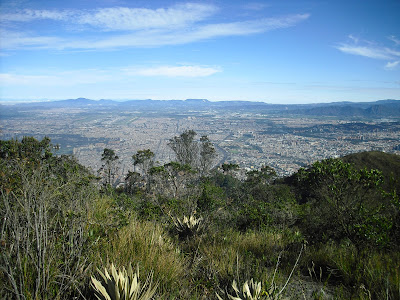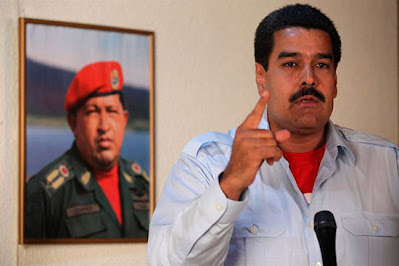[Listen to an audio version of this blog entry here.]
One trend I've noticed in Colombia's low-lying lands — lower than Bogotá that is — is that even rather small towns have a more sinister side to them compared to their loftier equivalents.
I refer to locations in what is called tierra caliente, literally 'hot land'. It seems to be a case of 'hot by name, hot — in various ways — by nature.'
I've found this "nastier nature" in the likes of Chaparral, Girardot, La Dorada and Tocaima.
Thus, it was to my pleasant surprise that I encountered no such dangers in the largely nondescript town of Villanueva on a recent, somewhat unplanned visit there. (The nearby Monterrey had been the original choice but bus schedules/routes meant it was easier and cheaper to get to Villanueva. For this particular trip, the destination was of secondary importance to the need to escape Bogotá.)
Indeed, the principal peeve is the regular noise from the big oil trucks constantly passing through. As my first night taught me, it's best not to take a hotel close to the main street. Thankfully, owing to the fact — one assumes — that it is a trucker stop, the town has many accommodation options dotted all over.
That aside, while the heat may give it a coastal vibe — minus the sea, of course — there appears to be none of those overbearing Costeño types about (Costeños being Colombians from the coast, particularly the Caribbean region). One is generally left to one's own devices. (Do note, I visited midweek, maybe it's different at the weekends, but I doubt it.)
The layout of the town itself very much reminded me of Casanare's capital, Yopal, a small city I visited a few years ago. I do recall being rather indifferent about Yopal. In fact, I remember thinking that it was relatively expensive, most likely due to the oil economy, so I left with more of a negative than positive impression.
Villanueva, on the other hand, seems affordable across the board. It must also be said that as a result of my current mindset even hell would entice me because of my general boredom with Bogotá.
One trend I've noticed in Colombia's low-lying lands — lower than Bogotá that is — is that even rather small towns have a more sinister side to them compared to their loftier equivalents.
 |
| Villanueva on the fringes: Looking south towards the vast plains. |
Bovines and barrels
As a very rough guide, it applies to places with an altitude below 1,500 metres. That is to say, an urban centre closer to sea level is, in my experience, more prone to insecurity issues than a similar-sized settlement at a higher altitude and thus cooler climate.I've found this "nastier nature" in the likes of Chaparral, Girardot, La Dorada and Tocaima.
Thus, it was to my pleasant surprise that I encountered no such dangers in the largely nondescript town of Villanueva on a recent, somewhat unplanned visit there. (The nearby Monterrey had been the original choice but bus schedules/routes meant it was easier and cheaper to get to Villanueva. For this particular trip, the destination was of secondary importance to the need to escape Bogotá.)
'If the town has a more sinister side, I didn't find it on this visit.'At 420 metres above sea level and sitting at the entrance to the Casanare department's vast low-lying plains, Los Llanos, which lead all the way to Venezuela, Villanueva's economy is chiefly driven by bovines and barrels. It is, after all, Colombia's cowboy country and also an important petroleum-producing region.
 |
| Cowboy country (no animals were hurt in the making of this monument). |
That aside, while the heat may give it a coastal vibe — minus the sea, of course — there appears to be none of those overbearing Costeño types about (Costeños being Colombians from the coast, particularly the Caribbean region). One is generally left to one's own devices. (Do note, I visited midweek, maybe it's different at the weekends, but I doubt it.)
Plain sailing
While my referring above to Villanueva as nondescript may seem negative, it's just a case that, architecturally wise, it hasn't much going for it. Those vast plains that stretch out to the east and south are, nonetheless, quite captivating, a significant contrast to the undulating landscape of the Andean region.The layout of the town itself very much reminded me of Casanare's capital, Yopal, a small city I visited a few years ago. I do recall being rather indifferent about Yopal. In fact, I remember thinking that it was relatively expensive, most likely due to the oil economy, so I left with more of a negative than positive impression.
Villanueva, on the other hand, seems affordable across the board. It must also be said that as a result of my current mindset even hell would entice me because of my general boredom with Bogotá.
 |
| Impressive: Río Upía. |
What Villanueva lacks — a stream aside — is a natural cooling-off spot within a comfortable walking distance. Yopal, for its part, does have the expanses of the River Cravo Sur close by.
There is, though, the impressive Río Upía eight kilometres south. It marks the border with the Meta department, with the small town of Barranca de Upía on the other side, on the river's southern banks. The broad, fast-flowing waters don't look like the best place to go for a refreshing dip all the same. Conditions might be a little tamer in the dry season.
Back in Villanueva, the barrios to the north-east of the lively main road offer a chilled-out vibe, nice for a casual wander as the town thins out and runs into sparse woodlands.
If the town has a more sinister side, I didn't find it on this visit. And going by the overall friendly demeanour of the locals, I'd be surprised if it does have one.
_______________________________________________________________
Listen to Wrong Way's Colombia Cast podcast here.
Facebook: Wrong Way Corrigan — The Blog & IQuiz "The Bogotá Pub Quiz".
There is, though, the impressive Río Upía eight kilometres south. It marks the border with the Meta department, with the small town of Barranca de Upía on the other side, on the river's southern banks. The broad, fast-flowing waters don't look like the best place to go for a refreshing dip all the same. Conditions might be a little tamer in the dry season.
Back in Villanueva, the barrios to the north-east of the lively main road offer a chilled-out vibe, nice for a casual wander as the town thins out and runs into sparse woodlands.
If the town has a more sinister side, I didn't find it on this visit. And going by the overall friendly demeanour of the locals, I'd be surprised if it does have one.
_______________________________________________________________
Listen to Wrong Way's Colombia Cast podcast here.
Facebook: Wrong Way Corrigan — The Blog & IQuiz "The Bogotá Pub Quiz".



